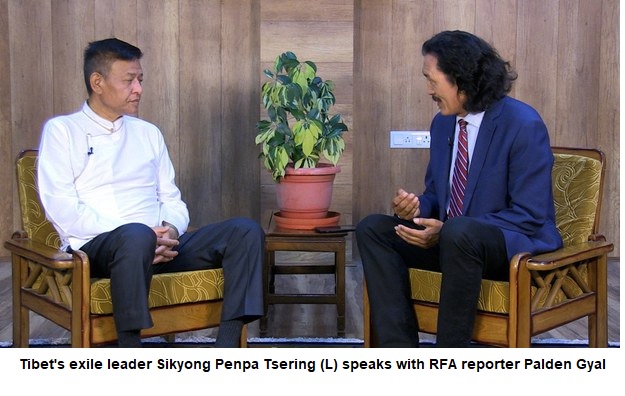Dalai Lama not a ‘separatist’: Tibet’s exile leader

Tibet’s Dalai Lama is not a separatist working to split Tibet from China’s rule, Tibetan exile political leader Sikyong Penpa Tsering told RFA in an exclusive interview on Friday. Instead, the exiled spiritual leader seeks only a peaceful solution to the question of Tibet’s status that protects Tibetans’ rights, Tsering said.
 Noting that the Chinese government has repeatedly accused the Dalai Lama and Tibet’s exile government (Central Tibetan Administration, CTA), of pushing for independence, Tsering said, “Contrary to what the Chinese Communist Party says in their propaganda, the Dalai Lama and the Middle Way approach contain no elements of separatism at all.”
Noting that the Chinese government has repeatedly accused the Dalai Lama and Tibet’s exile government (Central Tibetan Administration, CTA), of pushing for independence, Tsering said, “Contrary to what the Chinese Communist Party says in their propaganda, the Dalai Lama and the Middle Way approach contain no elements of separatism at all.”
Tsering’s remarks followed Beijing’s condemnation of a visit by Uzra Zeya, U.S. special coordinator for Tibetan issues, to Dharamsala, seat of the CTA, and of her meeting with the Dalai Lama last week.
Speaking to RFA, Tsering said the Chinese government’s constant protest of the CTA’s diplomatic engagement with other countries has only helped to publicize the Tibetans’ struggle around the world.
“The Chinese government may fool their own citizens, but they cannot fool the global audience,” he said.
“Our Middle Way policy is an approach adopted in consideration of resolving the issue of Tibet peacefully and of bringing about peaceful coexistence between the Tibetan and the Chinese people,” the exile leader added.
Tibetans frequently complain of discrimination and human rights abuses by Chinese authorities and policies they say are aimed at eradicating their national identity and culture.
In the debate over how best to advance Tibetans’ rights, the CTA and the Dalai Lama have adopted a policy approach called the Middle Way, which accepts Tibet’s present status as a part of China, but urges greater cultural and religious freedom, including strengthened language rights, for Tibetans living under Beijing’s rule.
From Dharamsala, Uzra Zeya travelled to Kathmandu for high-level talks. Since 1995, the Nepal government has stopped issuing refugee cards to Tibetans fleeing across the border from Tibet.
Nepal is seen by China as a partner in its Belt and Road Initiative to boost global trade through infrastructure investment, and Nepal’s government has cited promises of millions of dollars of Chinese investment in restricting Tibetan activities in the country.
Nepal’s close political ties with China have left the estimated 20,000 Tibetan refugees living in the Himalayan country uncertain of their status, vulnerable to abuses of their rights, and restricted in their freedoms of movement and expression, rights groups say.
https://www.rfa.org/english/news/tibet/leader-05202022151754.html
-
Book Shelf
-
 Book Review
DESTINY OF A DYSFUNCTIONAL NUCLEAR STATE
Book Review
DESTINY OF A DYSFUNCTIONAL NUCLEAR STATE
- Book ReviewChina FO Presser Where is the fountainhead of jihad?
- Book ReviewNews Pak Syndrome bedevils Indo-Bangla ties
- Book Review Understanding Vedic Equality….: Book Review
- Book Review Buddhism Made Easy: Book Review
- Book ReviewNews Elegant Summary Of Krishnamurti’s teachings
- Book Review Review: Perspectives: The Timeless Way of Wisdom
- Book ReviewNews Rituals too a world of Rhythm
- Book Review Marx After Marxism
- Book Review John Updike’s Terrorist – a review
-
-
Recent Top Post
- Commentaries Record Pentagon spending bill and America’s hidden nuclear rearmament
-
 CommentariesNews
Ides of trade between India and Pakistan
CommentariesNews
Ides of trade between India and Pakistan
-
 Commentaries
How sustainable is the rhetoric of India-China Bhai-Bhai
Commentaries
How sustainable is the rhetoric of India-China Bhai-Bhai
-
 CommentariesTop Story
New Set of Diplomatic Strains with Canada
CommentariesTop Story
New Set of Diplomatic Strains with Canada
-
 News
Ratan Tata’s Legacy
News
Ratan Tata’s Legacy
-
 Commentaries
India’s Strategic Push on the World Stage
Commentaries
India’s Strategic Push on the World Stage
- Commentaries Veils of Resistance
- Commentaries Ensuring Safety for Women Healthcare Workers
-
 CommentariesTop Story
Palestinians at the cross- roads
CommentariesTop Story
Palestinians at the cross- roads
-
 CommentariesTop Story
While Modi professes concern for the jobless, “his government’s budget escalates class war”
CommentariesTop Story
While Modi professes concern for the jobless, “his government’s budget escalates class war”
AdSense code
















